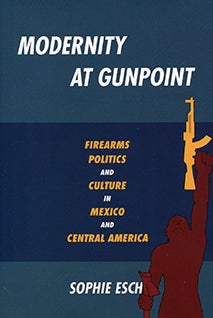Education
- PhD, Tulane University
Research and Teaching
- Mexican, Central American, and Luso-African Literature and Culture
- Comparative Literature
- Revolutions and War in the Global South
- Animal Studies and Environmental Humanities
Fall 2024 Courses
- LALX 378- Latin American Political Thought
Sophie Esch studies the intersection of literature, politics, and war in modern Latin America and Africa. She specializes in Mexican, Central American and Luso-African literature and culture. Her first book, Modernity at Gunpoint: Firearms, Politics, and Culture in Mexico and Central America, received the 2019 Best Book in the Humanities Award of the Mexico section of the Latin American Studies Association (LASA). Its Spanish translation, Letra y metralla. Cultura y política durante los periodos de conflictos armados en México y Centroamérica won the Premio Iberoamericano of LASA in 2023. The book provides a critical exploration of the political and cultural significance of firearms in the Mexican Revolution, the Sandinista Revolution, postwar Central America, and the drug war in Mexico. She is the editor of Central American Literature as World Literature. And special issues on animal studies, Mexican literature and Central America literature for Hispanic Review, Revista de Estudios Hispánicos, and Humanimalia.
Her current book project examines multispecies narratives of war and revolution in Latin America and Africa,.. The book provides a South-South comparison of prose fiction from Mozambique, Angola, Cuba, Guatemala, El Salvador, Nicaragua, Colombia, and Mexico. Her research has been supported by the Alexander von Humboldt Foundation (2022-24) and the National Endowment of the Humanities (2020).
She is the director of Rice’s new interdisciplinary Center for Latin American and Latinx Studies and the program advisor for the major and minor in Latin American and Latinx studies. She is a faculty affiliate of Politics, Law & Social Thought and the Center for the Study of Women, Gender, and Sexuality. In 2024, she received Rice’s Charles W. Duncan, Jr. Achievement Award for Outstanding Faculty.
1. Books and Edited Volumes
- Ed. Native Fauna in Latin American Literatures: Precolonial to Present Times, special issue for Hispanic Review, in progress
- Ed. Critters in the Mexican Cultural Imagination: Small Life/Literary Forms, special issue for Humanimalia, in progress
- Ed., Central American Literature as World Literature (New York: Bloomsbury, 2023).
- Ed., Passages: Routes of Migration and Memory in Central American Literature, special dossier of Revista de Estudios Hispánicos 54/1 (2020).
- Modernity at Gunpoint: Firearms, Politics, and Culture in Mexico and Central America (Pittsburgh, PA: University of Pittsburgh Press, 2018). Spanish translation 2022 as Letra y metralla.
- Ed. with Silke Helfrich, Martha Delgado, Hilda Salazar, María Luisa Torregrosa, and Iván Zúñiga, La gota de la vida: Hacia una gestión sustentable y democrática del agua (Mexico City: Ediciones Böll, 2006).
2. Journal Articles and Book Chapters
- “The Animal Turn,” More New Approaches in Latin American Studies, edited by Juan Poblete (under review)
- “Bonding in the Anthropocene: Collapse and Conviviality in Claudia Hernández’s Speculative Fiction (De fronteras and Causas naturales),” Writing the Post-Global in Latin America: Collapse and Conviviality, edited by Gesine Müller and Jan Knobloch (forthcoming)
- “El reino animal del narco: Zoológicos, soberanía y fantasía,” El cártel que se repite. El mito globalizado del 'narco', edited by Oswaldo Zavala (forthcoming)
- With Ignacio Sarmiento Panez, “World Literature in Minor Key: The Central American Short Story,” Central American Literature as World Literature, 2023.
- “Learning from Senselessness: The Act of Reading in Horacio Castellanos Moya’s Insensatez,” in Mónica Elizabeth Chacón and Mónica Albizúrez Gil (eds.), Teaching Central American Literature in a Global Context (New York: The Modern Language Association of America, 2022).
- With Alicia Miklos, “Stories of Giving Birth in Central America: Class, Race, and Politics in Women’s Health,” in David Dalton and Doug Weatherford (eds.), Healthcare in Latin America: A Reader (Gainesville, FL: University of Florida Press, 2022), 169-183.
- “Hippopotamus Dead or Alive: Animals and Trauma in Narratives of the Drug War,” Revista Hispánica Moderna 74/2 (2021), 184-199.
- “Uneven Battles: Central American Cold War Literature,” in Andrew Hammond (ed.), The Palgrave Handbook on Cold War Literature (Cham: Palgrave Macmillan, 2020), 451-69.
- “Naturaleza, tecnología y guerra: Modernidad encantada en la musicá sandinista,” TRANS: Revista Transcultural de Musicá 24 (2020), 1-13.
- “El rifle como reliquia en las memorias letradas sandinistas: Gioconda Belli y Sergio Ramírez,” Revista Telar 21 (2018), 113-36.
- “¿El arma en la sociedad? La novela del desmovilizado, militarismo e introspección en la obra de Castellanos Moya,” in Magdalena Perkowska and Oswaldo Zavala (eds.), Tiranas ficciones: Poéticas y políticas de la escritura en la obra de Horacio Castellanos Moya (Pittsburgh, PA: Instituto Internacional de Literatura Iberoamericana, 2018), 189-211.
- “In the Company of Animals: Otherness, Empathy, and Community in De fronteras by Claudia Hernández,”Revista de Estudios Hispánicos 51/3 (2017), 571-93.
- “In the Crossfire: Rascón Banda’s Contrabando and the ‘Narcoliterature’ Debate in Mexico,” Latin American Perspectives 41/2 (2014), 161-76.




